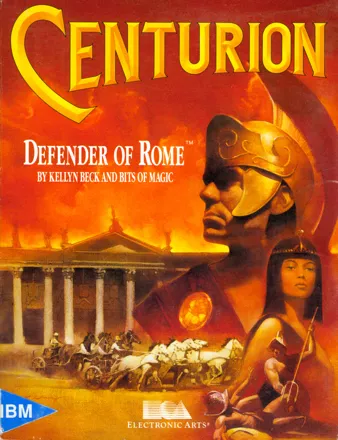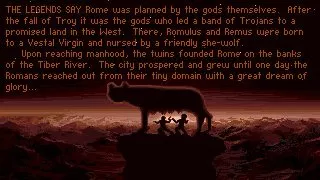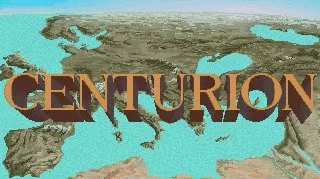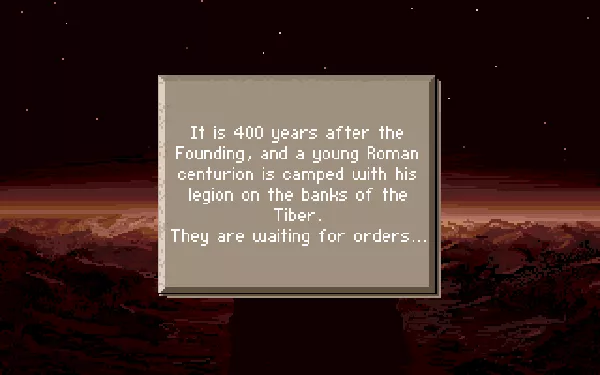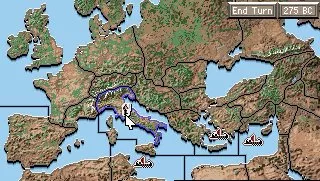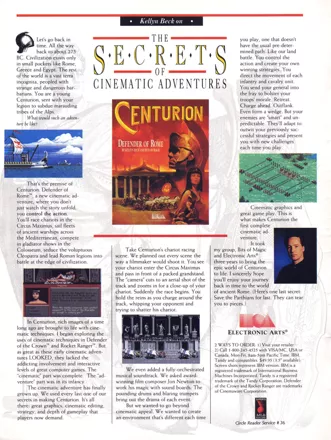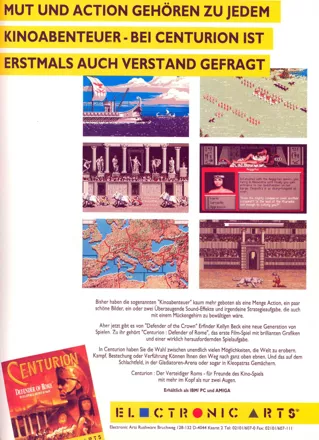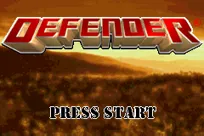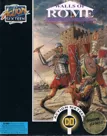Centurion: Defender of Rome
Description official descriptions
Starting as a young Roman legionnaire in 275BC, your job is to conquer the known world through force or diplomacy, fighting on land and sea.
Centurion: Defender of Rome is a turn-based strategy game. You start with one province, Rome, and one legion. To complete the game, you have to conquer all the provinces on the map.
One part of the game is micro-managing your provinces. You set up tax rates and make people happy by organizing games. In Rome, you can organize a chariot race, a gladiatorial combat or even a simulated naval battle; this starts an action mini-game where you control the chariot rider, gladiator or ship.
Another part of the game is military conquest. You can raise legions or strengthen them in any province you control (let's just hope there are enough men in the province, or your legion will be incomplete and weaker). There are three types of legions, each of them has a different strength. You can also move a legion to a neighbouring province.
When you enter a province you don't yet control, you can speak with the ruler there. With luck, you can convince him to give you the province for free; but this isn't very likely, and you'll often have to fight.
When your legion attacks a province, or defends one of your provinces from an invader, the game switches to an isometric view of the battlefield. You can give orders to your legion (assuming they are within the range of their commander's voice) and watch as they duke it out with the enemy forces. Eventually, one of the sides will be completely wiped out or panic and retreat.
Finally, you can buy warships and have naval battles with the enemy fleet. This is represented as an action mini-game, depicting a duel of the flagships; however, the outcome of the battle actually depends on the strength of your fleet.
Spellings
- センチュリオン Defender of Rome - Japanese spelling
Groups +
Screenshots
Promos
Credits (DOS version)
26 People · View all
| Project Leader | |
| Design | |
| Programming | |
| Level / Scenario Design | |
| Graphics / Artwork | |
| Music | |
| Cover Art | |
| Packaging | |
| Documentation | |
| Producer | |
| Associate Producer | |
| Assistant Producer | |
| Project Manager | |
| Project Director | |
| Technical Director | |
| Package Design & Illustration | |
| [ full credits ] | |
Reviews
Critics
Average score: 70% (based on 26 ratings)
Players
Average score: 3.7 out of 5 (based on 75 ratings with 9 reviews)
Become Caesar, conquer the known world.
The Good
The manual described Roman history including famous battles, the Generals in the game are historic, the provinces and largely historic but Britain for example was never entirely conquered (perhaps that's why they stay angry).
Going up in rank allowing better and more legions and fleets.
Provinces gradually being civilized going from Occupied or Ally to Colony and Citizens and paying higher taxes.
The capitol province of Italia falling and taxes stopping, makes the game very difficult at higher levels. You have to increase taxes when you reconquer it and risk rebellion.
Review: Centurion, Defender of Rome - or Centurion, Defender of Boredom as I remember it, good for killing time. You begin as a Roman Officer in charge of the Roman Empire's one and only province - Italia, with one Legion, and Rome's Garrison, which can not attack, only defend Italia. You must rise through the ranks (Centurion, Tribune, Legatus, General, Praetor, Consul, Proconsul, Caesar), by gaining (and holding!) Provinces & Legions, and winning Games. You can only become Caesar by conquering the entire known world (Europe and the Mediterranean).
There are five main sections to the game: The province map, land battles, sea battles, gladiatorial games, and chariot racing. Each can be set at a different level of difficulty, so if you are bad at one thing, and good at another, you can compensate.
There are 27 Provinces, most can be brought into the Empire by negotiation. Some will join as Allies, but will never advance beyond this, and will always be in an Angry state. There are 3 options at a time in negotiation, only one will be the right one. Some options are far more effective than others. A negotiation ends in 3 ways, the legion withdraws from the provinces, goes to war, or the Province becomes an Ally and the legion stays in place that turn. Some Provinces join sooner than others, as Allies, depending on your rank, and how many turns have passed. Do not bring Provinces into your empire you can not protect, as once lost, they will never re-negotiate, and must be conquered, joining the Empire in an Occupied state. You can also negotiate your way into Cleopatra's bed. Sometimes it is better to invade than wait for an Alliance, as that province may raise 2 or 3 barbarians armies in that time.
Provinces can be in four states: Occupied, Ally, Colony, and Citizens. They change state over time, providing they are not lost, and bring in more taxes with each improvement in state. They also provide reinforcement troops to repair damaged legions. Legions fight best when at full strength, and commanded by a good General. Allied provinces provide a vast number of recruits the first turn, enough to raise a Legion, sometimes.
Taxes are required to repair and raise Legions. Also to hold games to keep provinces in order. Each province has morale: Content, Restless, Angry, and Rebellious. If Rebellious, you will soon lose that Province unless you hold games, reduce taxes (or have none for a while in that province), or maintain a Garrison to crush any uprisings. Soon after it is likely to raise a barbarian army to threaten your borders. Tribute levels can be raised for a few turns, if necessary, but rebellious feeling will sweep your empire, so don't keep them high too long.
When Rome becomes unhappy you must have a Gladiatorial game, you can't just pay for this, you must fight it. Make sure to fight well, or the people will remain unhappy, deciding whether the opponent lives or dies greatly affects happiness, so please the crowd, or else! Paying for a better Gladiator helps, but also drains your treasury. If Rome rebels, you don't get any new taxes until it is reconquered. The Romans seem to want games, very often, the game would have been a lot better if this feature could have been turned off, as in one game you have to fight several dozens games, all the same, lasting 5 minutes each, EXTREMELY BORING, but very necessary. You can play without looking, so I used to flip over to a TV channel for the duration.
Another problem is the fleet, you need several dozen ships to transport a legion - which costs a fortune, yet minor kingdoms regularly raise fleets to send armies to attack you. If you wait to save enough tribute to build a fleet, you will have conquered enough provinces to attack North Africa by land! Fortunately some countries can be gained (if not held) by a small force sent to negotiate. Tribute can be gained gambling at the chariot races, lose a little money a few times, and your odds will go up, then gamble a lot, and win. It seems an unrealistic way to build your fleet though. I can only win chariot races at the lower levels. They can also be quite boring, as you have to do several laps, and bet several times, to make any real money, you also have to start with a reasonable stake.
Fleet battles are extremely tough, fight them at your own risk. If you are defeated you will lose expensive ships, plus the troops in them.
Land battles are the core of the game. Each legion gets a different general, Scipio Africanus, is the best. DON'T LOSE HIM! There are a number of infantry and cavalry (for speed) cohorts which can either be automated or directed. They fight better attacking at the side, or ganging up. You fare better, if you control all the cohorts, but this is tedious, and tricky. If you lose your General the armies courage goes down, and you can no longer direct cohorts, the same applies for your enemy, so try and get his General if you can.
You get better armies once you become a Tribune, gaining some two Cavalry groups, fighting without Cavalry is a nightmare. When you become Consul, you get two more Cavalry groups, (though they are not very easy to field), and more & higher strength cohorts, so they fight longer before folding and inflict more damage. Of course against Elephant or Cavalry, you will lose more troops. Once you have Consular Armies, you lose much less often, but have a new problem of finding lots more recruits to replace the higher casualties, and upgrade to larger armies (previous to this only Rome's Garrison is Consular, so sometimes it is a good idea to retreat a weak army and let the Garrison fight).
Much depends on which formation your enemy chooses, it's largely random. Each legion has a courage level, which improves over time (training): Panicky (only one Province luckily), Weak, Good, and Fierce. Courage, is effected by how high a regard they have for their general, and how many casualties the cohort has taken. The courage of each Province varies so try and recruit Fierce troops, all the time (they come mainly from the west), so in the costly eastern battles, you may not have enough good recruits (or they may be too far away), so you will have to compromise.
At higher levels, enemy elephants (you are not allowed any, even if you capture Provinces which have them), act very much like tanks, and decimate your Legions.
Most provinces in the east are weak but can't be taken, as they can't be held eg. Pontus, with weak mercenary troops, where Caesar did his 'I came, I saw, I conquered' thing. It's interesting to note the mighty Julius came to Britain, but did not conquer it, it was 100 years until Cladius mounted a successful invasion (shipping problems?). The Romans thought they would fall off the end of the earth, when they went to Britain.
Barbarian armies are forever appearing in Provinces, and rampage through other provinces (without ANY loses - not very realistic), until they get to you. They always terminate in Italia, either conquering it, or being defeated.
To conclude the game is great fun, and absorbing. You can suffer great
defeats, but with sacrifice fight back. There are however too many
tedious bits, which you should have been able to turn off. The fleet is
too expensive, perhaps you should begin with one. Historically Rome
attacked Sicilia, Hispania, Carthago, and Macedonia by sea, before
expanding elsewhere. Also you should be able to make peace with the
Cathagian, Greek, Egyptian, and Persian Empires (but not the barbarians)
- perhaps for tribute, of course they could decide to break the peace if
you get too strong, or attack each other - but the chance of unprovoked
attack should be greatly reduced. And it would be good to play as one of
the other powers, perhaps with Elephants. The casualty rate at the end is
interesting, I usually take about 100,000 dead to make the empire. Worth
it? Perhaps, better than endless barbarism.
The Bad
The DOS hack doesn't negotiate alliances correctly.
Having to play gladiator games every few turns over and over again, a real drag, should have been able to turn this feature off. But I suppose Roman Emperors had to attend games.
The fleet costs far to much, you can't take the war to the Carthaginians as the Romans did in history.
Barbarians being able to cross other territories without fighting their armies. Both should be reduced making defense and attack easier. Perhaps alliances could be introduced so several territories can fight as one.
The Bottom Line
Good strategic game teaches you history.
Amiga · by David Ledgard (58) · 2005
The Good
This is one of my favorite games of all time. While old and primitive by today's standards, Centurion was years ahead of its time and offers hours of fun gameplay.
The centerpiece of the game is real-time land battles. It may take a while to figure out the quirks and strategies of the units but it is well worth it. The game takes into account factors like unit moral, the direction units are facing (and being attacked by) and the general's abilities. These factors, along with army formations and tactics form an eligent and challenging experience which was unmached in gaming until the likes of "Shogun: Total War" came out almost 10 years later.
The empire level is fun as well. It's a turn based system where you can move your legions around, invade provinces, fight off invaders etc. Its deep enough to have stategic depth without being complicated or requiring micomanagement. There is only 2 resouces: money (talents) and manpower - both of which are usually in short supply. Eventually you earn enough promotions to command up to 14 legions and once you conquor the world you become Ceasar and win.
I also liked the fine tuned difficulty settings, where you could change how difficult each part of the game was, rather than the game as a whole. You could even change difficulty levels mid-game if things were too easy or too rough.
The Bad
But there are many flaws in the game. Graphics were clunky, even for 1991.
The costs of some things don't make any sense. An infantry legion (4200 foot soldiers) costs 20 talents, the same as a single galeon (which can carry only 200 soldiers) and the same as a heavy chariot for racing. This makes sea battes overly expensive and dangerous since you can lose your whole fleet if the battle goes badly. Its often easier to simply go around the whole mediteranian to conquer north africa than to build a fleet to cross it.
While land battles are excellent, chariot races and fleet battles are boring and poorly made. Thankfully we don't have to fight gladiator battles in the genisis version - which are even worse.
There are other minor detals which are irksom. Like not being able to combine armies or transfer troops, not being able to dismiss bad generals (being forced to suicide them in battle to be rid of them) and the really bad savegame password system.
The Bottom Line
A well designed empire building game with real-time land battles. A game ten years ahead of its time.
Genesis · by Tony Maki (10) · 2003
Another classic from the classic days of gaming
The Good
My brother in law was the manager of a computer store in the late 80's. One day he told me I could have one of the PC games in the discount box. I went through the titles and found this one. At first glance I didn't think much of it but it was the only thing in the box worth my time and it was free. It turned out to be a great game. Like all great classics the controls were easy to use and learn. I am a Ben Hurr fan (movie) and when I started a naval battle I heard the famous music from Ben Hurr. COOL!
The Bad
I never could master the art of diplomacy very well. I ended up 99% of the time using force. The naval portion of the game was a little lame. Your personal ship goes into combat with the enemy commanders ship. Instead of tatical control of all the fleet. That is decided my several factors not in your control.
The Bottom Line
A must for any Classic Gamer.
DOS · by William Shawn McDonie (1131) · 2001
Trivia
Awards
- Enchanted Realms
- September 1991 (Issue #8) – Distinctive Adventure Award
Music
The music used in the naval battles was taken from the movie Ben Hur. It was in the scene where Ben Hur was a galley slave.
Information also contributed by William Shawn McDonie
Analytics
Upgrade to MobyPro to view research rankings!
Related Sites +
-
The Homepage of Mark the Conqueror
screenshots, information, tips, & a tutorial for Centurion: Defender of Rome
Identifiers +
Contribute
Are you familiar with this game? Help document and preserve this entry in video game history! If your contribution is approved, you will earn points and be credited as a contributor.
Contributors to this Entry
Game added by Raphael.
Genesis added by PCGamer77. PC-98, FM Towns added by Terok Nor. Amiga added by MAT.
Additional contributors: MAT, Patrick Bregger, Narushima.
Game added August 14, 1999. Last modified January 11, 2024.
